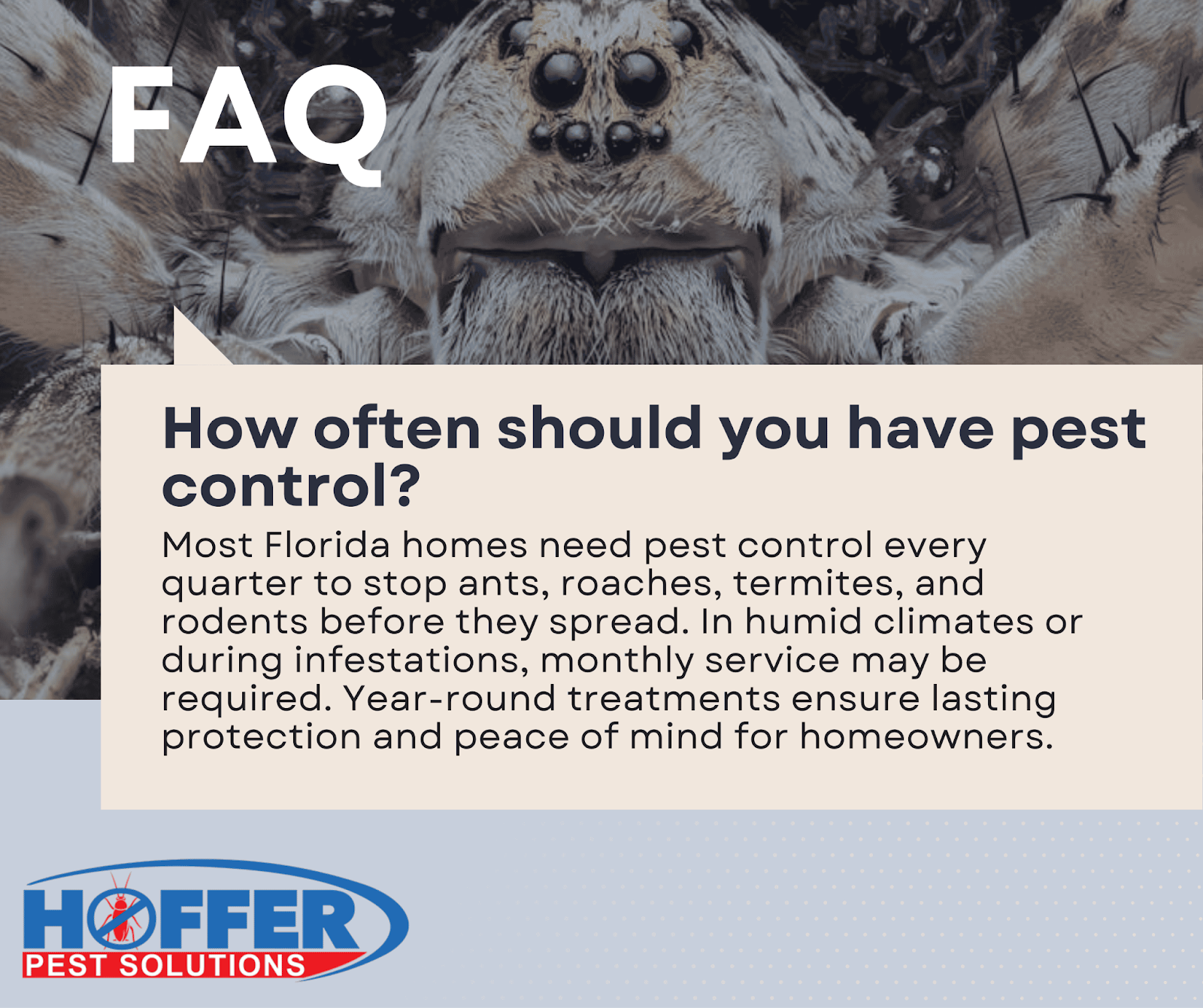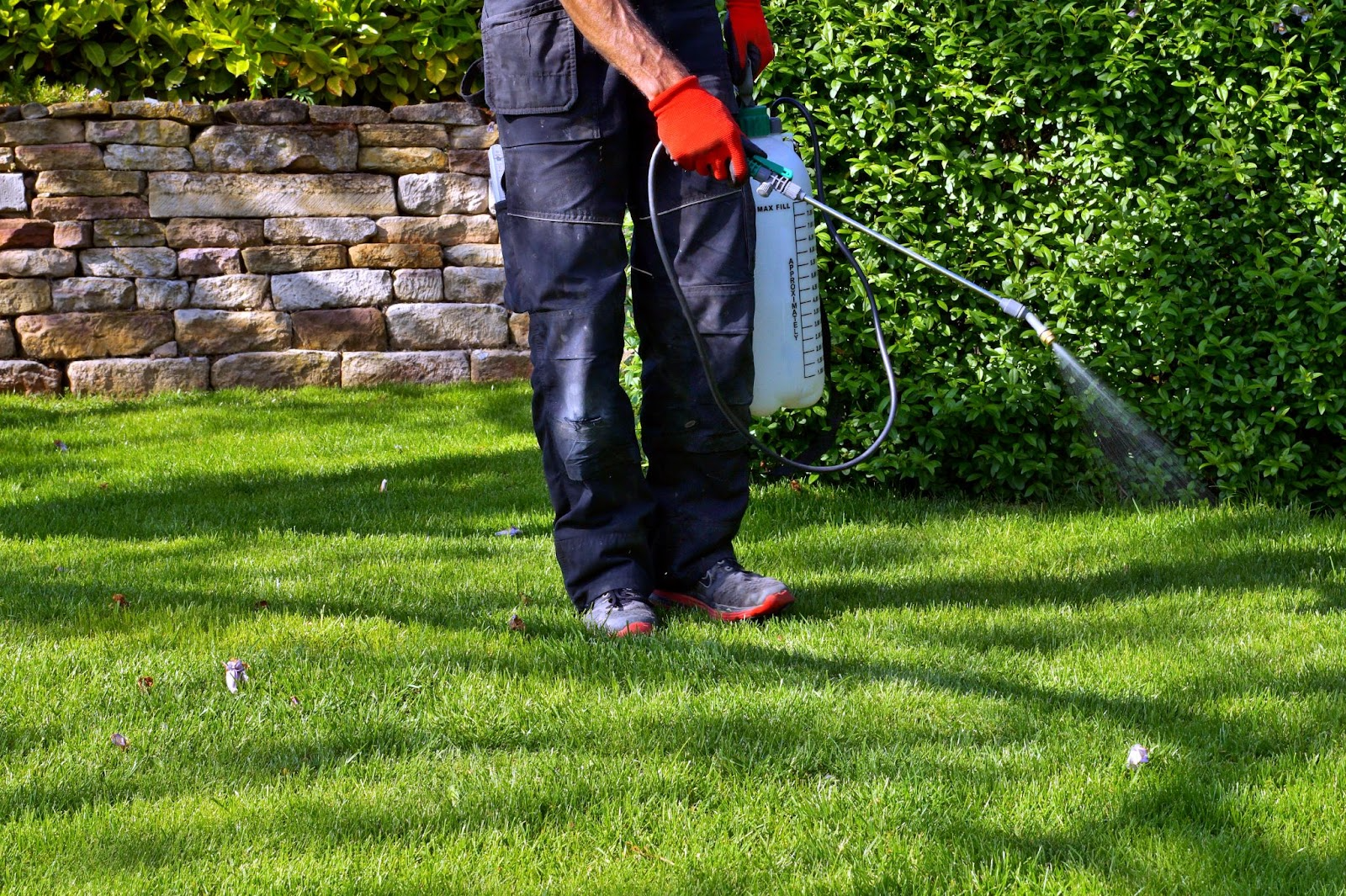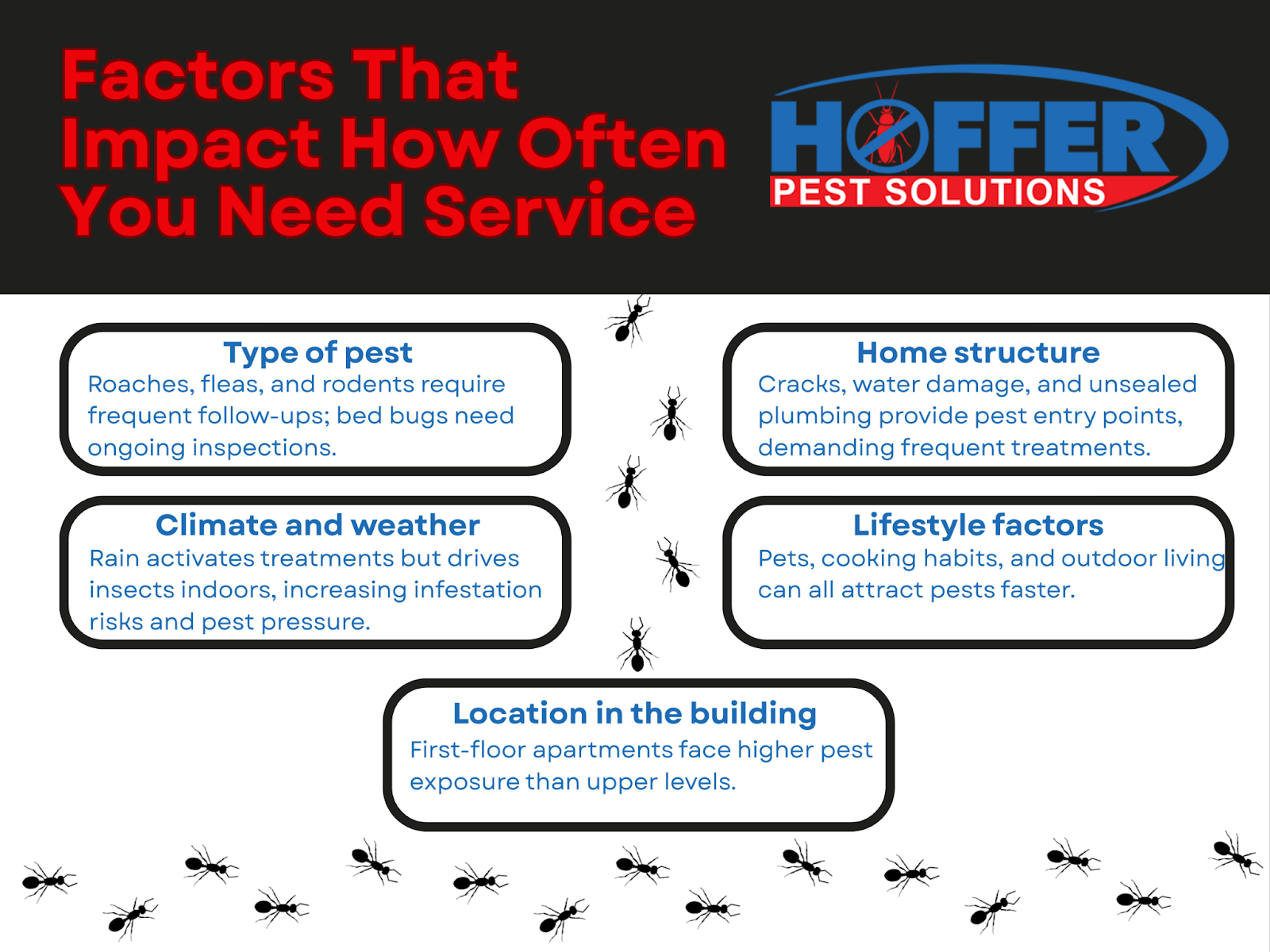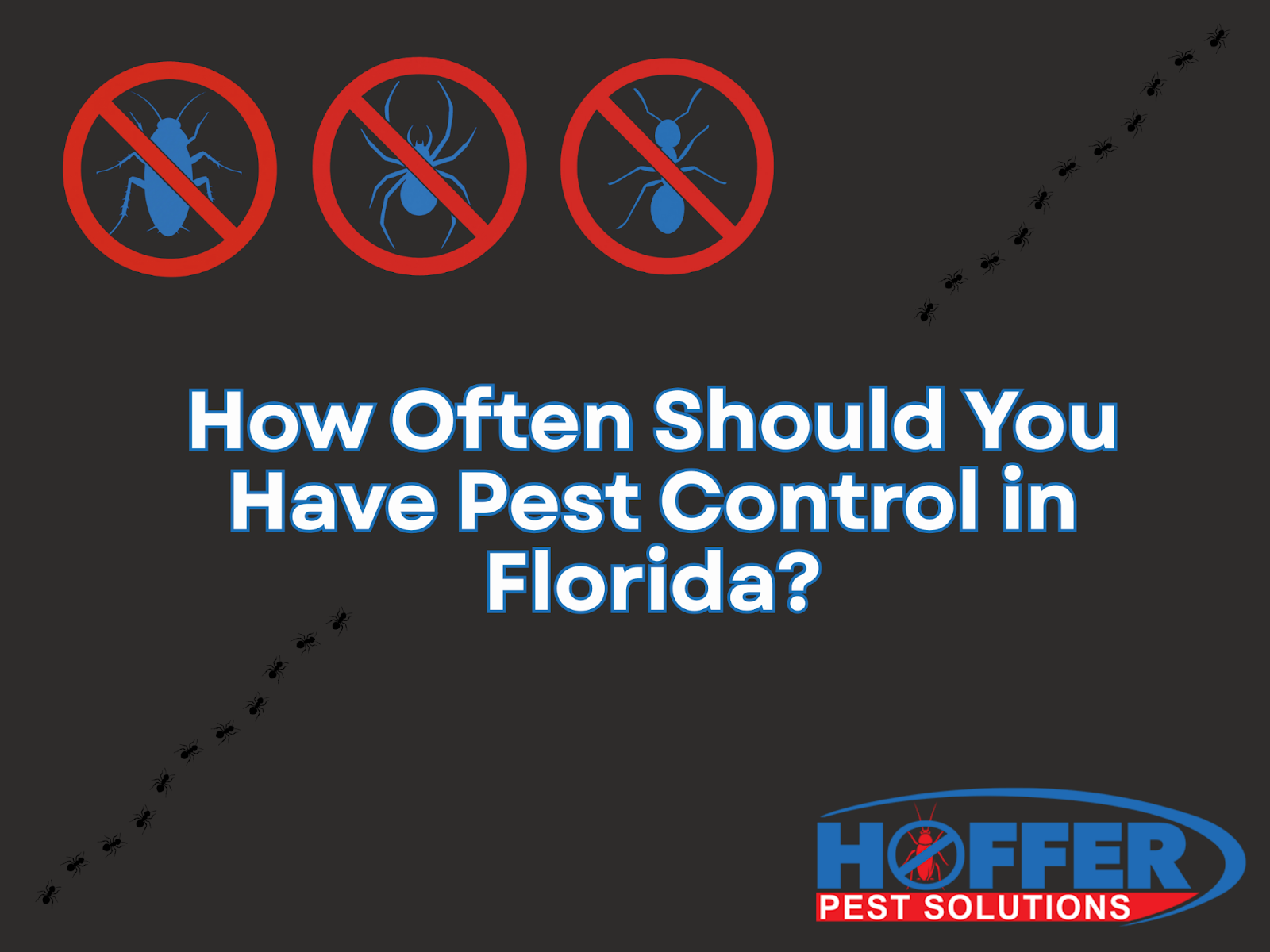Most Florida homes need pest control every quarter to stop ants, roaches, termites, and rodents before they spread. In humid climates or during infestations, monthly service may be required. Year-round treatments ensure lasting protection and peace of mind for homeowners.

Quarterly service is the national standard, but South Florida’s climate means pests never take a break. That’s why some homes require bi-monthly or monthly visits depending on the type of pest, severity of the problem, and even the structure of your home.
Hoffer Pest Solutions has protected Florida families for over 40 years with same-day service, eco-friendly methods, and bundled plans that make year-round protection simple and affordable.
If you want the full breakdown of when quarterly is enough, when monthly is necessary, and how Florida’s unique environment changes the rules, keep reading.
The Standard Pest Control Schedule
Across the country, quarterly pest control is the industry standard. Large companies recommend four visits per year because it matches pest reproduction cycles and provides steady protection at a predictable cost. For most homes, quarterly treatments are the “sweet spot” between effectiveness and affordability.
But Florida homes often present unique challenges. The combination of humidity, heavy rains, and structural vulnerabilities like foundation cracks makes pests more persistent. Ant colonies thrive year-round, termites never rest, and cockroaches multiply quickly in warm conditions. While quarterly treatments provide peace of mind, many Florida homeowners find they need additional protection to stay ahead of local pest pressures.
When You May Need Pest Control More Frequently

Active Infestations
If you’re already dealing with ants, roaches, or rodents, quarterly visits won’t be enough to bring the population under control. In these situations, monthly treatments for three to six months are recommended until the infestation is eliminated.
It’s normal to see pests, especially roaches, after an initial spray. In fact, seeing dead ones is often a sign that the treatment is working. A common worry we hear is whether requesting a second treatment just a week later will speed things up. The truth is treatments need time to disrupt breeding cycles, and over-spraying can be both ineffective and unsafe.
Apartments & Shared Buildings
In multi-unit housing, pests spread from unit to unit. First-floor apartments are particularly vulnerable because they’re closest to ground-level entry points. Many residents believe complexes spray weekly, but in reality, those visits often involve inspections or bait checks rather than full treatments. For apartment dwellers, quarterly service may not cut it, bi-monthly or even monthly treatments are often needed to keep infestations from spreading through shared walls and plumbing lines.
Seasonal Pests & Florida’s Climate
Florida is unique: pest control here is never seasonal, it’s year-round. Still, certain pests are more aggressive at different times of year. Mosquito populations surge in the summer, requiring monthly treatments or seasonal packages to keep backyards livable. Termite fumigation can last up to four years, but inspections every two to four years are necessary because colonies may re-establish. For homeowners in South Florida, a “set it and forget it” plan simply doesn’t work, schedules must adapt to pest activity and climate.
Factors That Impact How Often You Need Service

The right pest control frequency isn’t one-size-fits-all. Several factors determine your schedule:
- Type of pest: Roaches and fleas reproduce quickly, demanding closer follow-ups. Bed bug treatments can last indefinitely if the source is removed, but inspections remain necessary. Rodents often require ongoing monitoring and exclusion, not just traps.
- Home structure: Water damage, cracks in foundations, or unsealed plumbing give pests easy access. These vulnerabilities increase the need for frequent visits.
- Climate and weather: Heavy rains don’t wash treatments away, in fact, many products are activated by moisture, but they also drive insects indoors, raising pressure.
- Lifestyle factors: Pets, cooking habits, and outdoor living can all attract pests faster.
- Location in the building: First-floor apartments face higher pest exposure than upper levels.
Every home is different, which is why professional inspections are so necessary. They reveal risks you might not see, like plumbing gaps or roofline openings, that determine how often treatments should be applied. Need help? Contact Hoffer Pest Solutions today.
Myths and Misconceptions About Pest Control Frequency
Many homeowners hold misconceptions about how often pest control should be done. A few of the most common:
Myth 1: More spraying means faster results
In reality, over-spraying can backfire. Most pesticides have legal limits on frequency, and excessive use can reduce effectiveness or create resistant pest populations.
Myth 2: New homes don’t need pest control
New construction often attracts pests. Materials are stored outdoors before use, soil is disturbed during building, and moisture in fresh concrete and wood draws insects. Without service, even brand-new homes can face termite or ant problems within months.
Myth 3: Winter means no pest control
While some northern regions can ease back during colder months, Florida homeowners can’t. Rodents, roaches, and spiders actively move indoors seeking warmth and food, making winter one of the most critical times to maintain treatments.
Why Florida Residents Need a Different Approach
In colder regions, some pests slow down in the winter, giving homeowners a break from treatments. In South Florida, pests never hibernate. Ants, termites, cockroaches, and rodents thrive year-round, which means homeowners here need uninterrupted protection.
Think of pest control like HVAC maintenance; you wouldn’t wait for your air conditioner to fail in July to schedule service. Likewise, pest control in Florida works best as ongoing prevention, not as a reaction when pests are already out of hand.
Why Work with Hoffer Pest Solutions?

Hoffer Pest Solutions has been protecting South Florida homes and businesses for more than 40 years. As a locally owned and family-run company, we know firsthand the unique challenges our climate presents, and we live in the same communities we serve.
Here’s what sets us apart:
- Same-day service when pests can’t wait. If you call before noon, we’ll be there that day to restore your peace of mind.
- Comprehensive protection. Our Home Shield Plans combine pest, mosquito, termite, and rodent control into one affordable package.
- Eco-friendly focus. We use Integrated Pest Management (IPM) strategies to reduce chemical reliance, protecting your family and the environment.
- Generational trust. Many of our customers have stayed with us for decades, because we treat homes as if they were our own.
For us, pest control is about delivering safety, comfort, and lasting relationships.
Taking Action Against Pests in Florida
Waiting until pests take over is costly, termites can cause thousands in damage, and roaches or rodents spread quickly. Preventive service is always cheaper and safer than crisis treatments.
With bundled plans, Hoffer Pest Solutions provides year-round protection for pests, termites, mosquitoes, and more, saving you money while keeping your home secure. Schedule a free inspection today and let us help you stay pest-free with confidence.
Frequently Asked Questions (FAQ)
How soon should I see results after treatment?
For most pests, you’ll start noticing results within days. Cockroaches, however, may take weeks because of their egg cycles. Seeing dead pests is proof the treatment is doing its job.
Can pests come back between visits?
Yes. Pests can reappear if neighbors have infestations, if weather drives them indoors, or if new colonies form. This is why consistent, recurring treatments are more effective than one-time sprays. They break cycles before populations surge again.
Are there laws about how often pest control can be done?
Absolutely. Pesticide labels are legally binding, and most products do not allow weekly applications. Over-application can be unsafe and even illegal. Responsible pest control companies follow these regulations closely to keep your family safe.
Will rain wash away my treatment?
No. In fact, many outdoor products are designed to work with moisture and are activated by rain. Rather than canceling service during rainy weeks, treatments remain effective or even enhanced.


